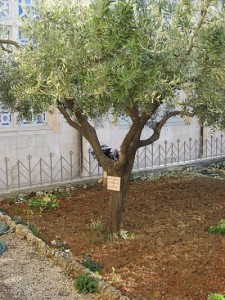Pope Francis Plants an Olive Tree in the Vatican Garden
Ayala Emmett

Photo Courtesy of www.opendemocracy.net
Pope Francis picked up the peace banner at a time when supporters of a peace agreement between Israelis and Palestinians have been in despair and disheartened. No one on either side of the conflict seems willing to meet at home. Yet, in Rome this past Sunday two leaders who signed the Oslo agreement in 1993, Israeli President Shimon Peres, and Palestinian President Mahmoud Abbas joined the Pope to plant an olive tree in the Vatican garden together with Orthodox Ecumenical Patriarch Bartholomew. Prayers were recited by Jewish, Muslim and Christian clergy and speeches were made in several languages, Arabic, Hebrew, English, and Italian; yet the message was the same in all languages: peace and co-existence.
Two weeks ago the Pope began his peace mission on his visit to the Holy Land in which he prayed for peace at sacred and contentious walls, the Western Wall and the Wall of Separation; he prayed in front of graffiti “Free Palestine” and in front of a memorial to Jewish victims of terrorism. In each place he noted the tragedy of human suffering and to each side he offered a message of peace and reconciliation.
On that visit, the Pope extended an invitation to Israeli President Shimon Peres, who would be replaced at the end of the month by the newly elected president Reuven Rivlin, and to Palestinian President Mahmoud Abbas, who has just formed a unity government. Both accepted and came to Rome on Sunday for a peace prayer and a face-to-face meeting that included embracing each other and planting an iconic tree in the Vatican garden.
In the book of Genesis, the olive tree, or at least an olive leaf, is part of the covenantal narrative familiar to the participants in the planting ceremony and now also familiar to those who saw the blockbuster film, Noah. In the biblical narrative Noah sends out the dove that comes back holding an olive leaf in its beak. The Genesis larger theme is about God’s promise of a no-destruction covenant, “never again shall there be a flood to destroy the earth” [9:11]. A covenant to end the war was what the Pope suggested when he called on “never again war.” As in the biblical narrative of the flood, Pope Francis said that in war, “everything is destroyed.”
I have no idea whether Pope Francis was deliberately drawing on Genesis, but he decided to plant an olive tree in the Vatican garden, to indicate the need for a new covenant between people, a covenant of “never again war.” This olive tree that he planted will now have to grow not only in the soil of the Vatican, but in the political landscape of Israelis and Palestinians. The Pope, whose message echoes a biblical covenant, who convenes a president from each side of the conflict and brings together high ranking clergy of three faith traditions for a prayer may seem to peace activists as little more than a nice gesture. Some peace supporters may argue that the prayer meeting in Rome, and Abbas and Peres public hugging produce a religious performance with little impact on the so-called real political world where things happen.
So what was happening in the real world of politics and politicians lately? In that world strange/contradictory things could happen. While President Peres went to Rome to plant a tree and pray for peace, Prime Minister Netanyahu authorized more settlements, rejected the Palestinian unity government, ended relations with the Palestinian Authority and tried and failed to enlist the U.S and the E.U to boycott the new government. And President Abbas’ unity government has yet to unfold.
Here are the facts on the ground: politics as usual and diplomacy intervention have failed to achieve a peace agreement. So
there isn’t much to lose by stepping out of conventional political thinking to suggest that peace groups, organizations and individuals should join Pope Francis. Yes, that would be an unusual alliance for supporters of peace and a two-states agreement who have always looked to Washington’s global influence and power.
There is another way to think of global influence: the Pope has an audience of 1.2 billion Catholics. No peace rally in Tel Aviv or New York could compete with that. We, peace supporters, could think of the global power of an iconic olive tree that grows in the Vatican garden. Here is a wild idea: We could have the next peace rally in Vatican City. The visual of the quartet planting the tree could be part of our new logo for a peace treaty.
Perhaps in the intersection where prayer meets peace we, who support a peace agreement and two-states for two people, could find in Pope Francis a powerful global ecumenical voice. We could help the Pope grow the olive tree of peace and Pope Francis could deliver our message to more than a billion people.